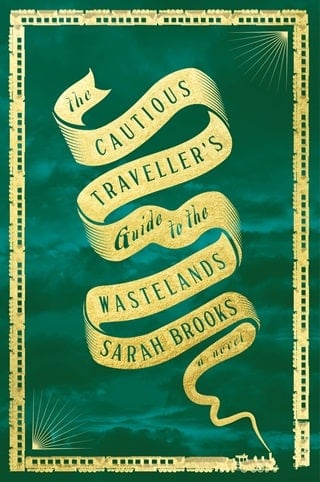3. The Naturalist
There is a man watching birds from the farthest window in the observation car. Azure-winged magpies—Cyanopica cyanus—burst from willow trees as the train roars past, the long feathers of their tails iridescent in the afternoon sunlight. When Henry Grey looks at a living thing he sees it as a system of vessels, connected to each other in a pattern of infinite skill. He wants to get closer, longs to touch each quickening of sinew and twitch of muscle, to feel the pulse of life beneath his fingers. In his mind's eye he walks the corridors of a great glass building, each room filled with marvelous exhibits behind still more glass, eyes swiveling toward him. They are waiting for him to reveal their secrets. He feels their urgency. He has always felt it—the natural world waiting for him, challenging him. When he looks Heavenwards every bird is writing on the sky in words he longs to understand. Beneath his feet the earth is fat with promise.
He winces as a sharp pain stabs at his abdomen, and rummages in his pocket for the little bottle of pills made up for him at the Foreigners' Hospital. An ulcer, they had told him, he should try not to exert himself. "We advise against both physical and mental exertion," the doctor had said, a little Italian who had the manners of all the foreigners Grey had met in Beijing, a tendency to talk too loudly and too fast, as if their attention was always elsewhere. He returns the pills to his pocket and takes a seat on one of the couches that run along the center of the carriage, where passengers may sit back and observe the views through the wide windows that run along three sides of the observation car, the final carriage of the train. Even the roof is made of glass, though, like the windows, it is criss-crossed with iron bars. He watches as the low, ornate buildings of the capital fall away, bell towers and tiled roofs disappearing into the steam. He has found it a loud, tiresome city, excessively pleased with itself, and far too keen to empty an innocent man's pockets.
"Fifteen days," he says to himself. In fifteen days they will reach Moscow, and the Great Exhibition, and he will at last have the chance to redeem himself. His stomach twinges again but it is the sharp, almost pleasurable pain of expectation. It is the pain he feels when he is on the cusp of a discovery, when an idea is dancing tantalizingly within reach, or when he has found, beneath a rock or within a stream, some new and marvelous creature whose meaning he does not yet understand.
A sudden hearty laugh interrupts his reverie, and a young couple enter the carriage, speaking French. Of the man, he gains only a faintly disagreeable impression of too much hair and too many teeth, but the lady has a pale and delicate kind of beauty. He nods stiffly to them and turns back to the window. He is ill at ease in the company of fellow travellers and has no wish to cultivate new acquaintances. He has met many such travellers in the course of his journeys, at those hotels and inns in which European languages are spoken and the food—while a thin imitation of proper nourishment—can be eaten with familiar utensils. He has suffered too many tedious evenings, amazed at how they can speak so long about so little. Though they could be among the grandest of mountains or cities, their horizons remain barely wider than the walls of their own estates.
He takes another pill, glancing down at the bottle, which feels considerably lighter than it should do. He should have taken the opportunity to get more, but after months of inaction these last weeks have passed in a whirl of research and preparations.
Grey had reached China by a long and perilous route, sailing around the Cape and travelling slowly across India and then into the country from the south. After his humiliation in London (he should not think of it, even the barest mention makes the pain in his stomach flare up), funds had been tight, but he still had the proceeds from his book, and if he succeeded—well, he would not need to worry about money again. It had taken eight months of travel to collect the specimens he needed, but then disaster had struck—his entire collection of live specimens and most of his belongings had been washed away in a flood in Yunnan, after unusually heavy rains. He had finally arrived in Beijing, with his funds almost depleted, and nothing more to show for his travels than a few cases of insects pinned to felt, some pressed grasses and flowers, and his sketches, only to find, in a final insult, that the Trans-Siberian Express had been suspended until further notice. He had almost given up hope. But then God guided his steps to the man who would lead him to redemption. It is proof, he thinks; proof that God has a plan for him.
More laughter from the Frenchman. It is unbearable. Grey draws himself up to his full height and turns, ready to freeze them with a look, but the man has his wife's hand in his, and is drawing it to his lips as boldly as if they were quite alone. Henry feels his cheeks flame and tries to sink back down into the couch, but it is too late.
"Ah, my apologies!" the man exclaims, in accented English, and bows to Grey. "I hope a man may be forgiven for forgetting his manners in the presence of his wife. Guillaume LaFontaine, and my wife, Madame Sophie LaFontaine."
Grey forces a smile and allows for the smallest incline of his head. "Dr. Henry Grey," he replies, watching for any hint of mockery upon their faces. He has come to know the signs; the twitch of a lip, the sideways glance. How those long-winded buffoons from the Royal Scientific Society had enjoyed his humiliation in London, and even when he escaped the country he could not escape the stares and the knowing smiles. His fall had been reported in scientific journals around the world; had even made its way into the popular press, with its cruel little cartoons. But he sees nothing in the LaFontaines' expressions to betray any recognition at his name, and holds himself a little easier.
"I am sure we are to become friends," LaFontaine goes on. "I expect we shall have much to talk about. My wife knows that I have been bursting with impatience to meet our fellow passengers."
Traversers,thinks Grey, with some disdain. The wretched Rostov and his book had a lot to answer for—without him the train would have been left to the serious traveller, firm in purpose, not these foolish gamblers, so rich in money and time that they must find dangerous ways of spending it. They take the train only to collect an experience, like a pretty keepsake they can hang on their wall, to boast about to their friends. They will return home to their comfortable lives, their salons and coffee houses, barely touched by the marvels they have seen. He pities them, and finds it a pleasant feeling.
"I travel for study, sir," he says, "and fear I will have little time for the pleasures of conversation."
"Come, Dr. Grey," says LaFontaine, "surely there is time enough on this moving fortress for anything we like. When else are we to have so many hours and days released from the burdens of yet another art gallery, yet another museum, yet another statue by some long-dead sculptor which one cannot possibly leave without seeing? We are released from the tyranny of decision-making. What restaurant shall we eat at tonight, my dear? Ah, I know it already! What blessed relief!"
Grey gives a tight smile. "We may certainly be grateful for that. But we must not forget where we are. This is not a journey to be taken lightly."
As the morning draws on, other passengers begin to enter the observation car, though some take one look at the wide windows and the open sky and back straight out again. A cleric enters, holding an iron cross and rosary in his hands. He has a haunted look, and stands at the far window, turning the rosary around in his fingers and reciting a prayer, more loudly than is surely necessary.
Grey takes the language he is speaking to be Russian, and although he cannot understand a word of it the cadences of the prayer are as familiar to him as his own liturgy back home, a rising and falling of promises and pleas that wrap around him as they leave Beijing behind, travelling now through fields and scattered farm buildings. Those working in the fields stand still and stare. Some of them take off their hats and bow their heads. Some of them make signs in the air; arcane symbols to ward off ill-luck.
 Fullepub
Fullepub 



